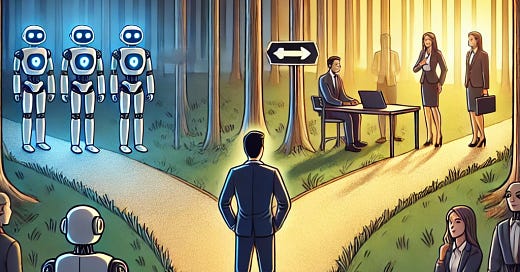Why AI won't change legal work overnight
In the race between AI and culture, bet on the tortoise
I was chatting with my buddy Mo the other day about which website hosting tool to switch to for DraftPilot. I had already spent an hour with an AI tool (am loving Perplexity for that) scanning countless reviews and Reddit threads.
But something still made me pick up the phone to Mo.
Mo's not some hosting guru - he’s just really good at figuring out the best tools for a job. So here I was, ignoring all that AI research to get his take. Why?
It hit me: this is how my brain is wired. "Complex tech decision = call Mo." It's my default setting, my muscle memory.
This got me thinking about how AI will actually change our working world. Yes, AI can do amazing things, and the list of what it’s capable of is growing every day.
But changing human behavior? That seems to work on a different timeline.
The Slow Dance of Change
Look at email. We had it in the 90s, but law firms were still faxing documents well into the 2010s. I still remember the older partners having every incoming email printed and put on their desk to read in hard copy.
We see this pattern everywhere:
Planes have had autopilot for decades. Yet Boeing is still building planes with cockpits designed for two human pilots.
In healthcare, AI can spot tumors in scans better than human doctors. But patients still want to sit down with their doctor, look them in the eye, and talk it through.
Investment apps can build perfectly optimized portfolios. But most people still prefer meeting their financial advisor for coffee and a chat about their retirement plans.
What This Means for Legal Work
I think we’ll see autonomous AI adoption (i.e. Legal AI for business users) move faster on work where the business doesn’t want to talk to legal anyway.
E.g. a sales team member needs to know the company’s document retention policy to answer a customer’s question. Having an AI chatbot answer that instantly is a no brainer.
But imagine you're negotiating a make-or-break deal with a large customer. The business team isn't going to want to solely trust an AI chat bot's take on negotiation strategy (at least not for a while). They'll want to call their favorite in-house lawyer, get a vibe check, hear war stories from similar deals.
"Remember when we tried pushing hard on liability caps with Company X? The argument that resonated was Y, not Z.”
The desire to tap into that kind of context and relationship is not going anywhere fast.
The Timeline Reality Check
This is why I think we're looking at a 5-15 year change curve for disruptive change in the legal sector, not the 1-2 years some predict.
It's like how older folks still prefer phone calls while younger people text. Complete cultural change often requires a new generation to come of age.
That's also why at DraftPilot, we're building AI tools for lawyers, not to replace them.
I don’t know any corporate CEOs who are anywhere near ready to let AI handle big agreements without their legal team’s review - the risk just isn't worth it.
And I don’t think corporates will be ready for that for years and years to come - even if theoretically you could prove the tools could do it (which they can’t right now, but in a few years, who knows).
But those same CEOs would love their legal team to create that markup in 15-30 minutes instead of 3 hours. Best of both worlds.
Embracing How Humans Actually Work
Maybe we're thinking about this all wrong. Why fight against human nature's preference for trusted advisors? What's wrong with wanting to talk things through with someone who gets it?
Instead of trying to force everyone to suddenly trust AI systems to replace our colleagues, why not superpower the advisors people already trust?
Throughout history, the most lasting changes haven't come from replacing human connections, but from making them more valuable.
Better, faster & cheaper can be achieved without replacing folks wholesale. And I like the fact that most people I speak to at corporates think this way.
Human skill, expertise and relationships aren't limitations to work around - they're assets to build on.
So while AI capabilities might sprint ahead, cultural change will jog along at its own pace. And that's not just ok - it might be exactly what we need.
After all, I still call Mo about tech decisions. And you know what? My day is usually brighter when I do!
Thanks for being here,
Daniel
CEO at DraftPilot
LinkedIn




